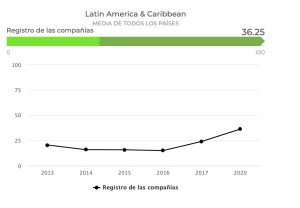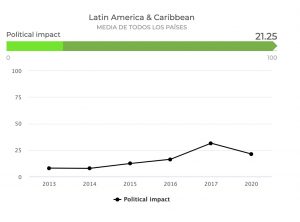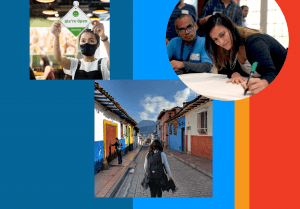Closed Democracies in Latin America? Openness at a Crossroads
¿Democracias cerradas en América Latina? La apertura en la encrucijada
Democracy is facing challenging times globally and especially in Latin America. In the region, only three countries are considered full democracies and democracy is backsliding overall. ILDA’s recently published open data barometer for Latin America and the Caribbean shows that open dataBy opening up data and making it sharable and reusable, governments can enable informed debate, better decision making, and the development of innovative new services. Technical specifications: Polici... and transparencyAccording to OGP’s Articles of Governance, transparency occurs when “government-held information (including on activities and decisions) is open, comprehensive, timely, freely available to the pub... More are stagnant. How transparent are Latin American democracies in the digital era? To what extent can transparency strengthen democracy in the region?
A decade ago, the open data movement put forward the idea that data openness by governments would bring about political, social, and economic benefits. Still, the results are far from what developed countries or open data leaders achieved. Examples include openness of datasets of company beneficial ownershipDisclosing beneficial owners — those who ultimately control or profit from a business — is essential for combating corruption, stemming illicit financial flows, and fighting tax evasion. Technical... More, which has progressed very slowly in the region despite being discussed in action plans and included in anti-corruption commitments. Disclosure of these kinds of data will allow for better control of lobbyingLobbying transparency allows the public to ensure that there is diversity of participation and contribution to public decision-making. Technical specifications: Policies and actions affecting lobbying..., conflict of interest, and corruption across the region.

Average of company registry in Latin America and the Caribbean from 2013 to 2020. Graph created by ILDA.
Overall, the impact of data use for policymaking has been limited. Although it has consistently grown in the leading countries, this growth is far from ideal. Several reasons lie behind this. First, data use requires investments and skills that are not fully distributed across the region. Second, greater availability does not equal good quality. Finally, there are structural factors related to inclusionOGP participating governments are working to create governments that truly serve all people. Commitments in this area may address persons with disabilities, women and girls, lesbian, gay, bisexual, tr... More, freedom of expressionJournalists and activists are critical intermediaries connecting public officials with citizens and serving as government watchdogs, and their rights and safety need to be protected. Technical specifi... More and accountability that prevent open data from having tangible impacts on accountability. Transparency is a requirement – but does not guarantee – plural, full democracies.
The way forward is uncertain and there is no silver bullet. However, we believe that transparency and openness are essential elements of solid democracies. Countries in Latin America and the Caribbean can make better decisions to improve democracies in challenging times. To this end, they must put transparency and openness at the center of democracy-related discussions in the region. It is about encouraging high-level political will to renew efforts by the government and society in this agenda. Without this commitmentOGP commitments are promises for reform co-created by governments and civil society and submitted as part of an action plan. Commitments typically include a description of the problem, concrete action... and clear leadership from countries and organizations, progress will be difficult to achieve.

Average of political impact of open datasets from 2013 to 2020. Graph created by ILDA.
At the technical level, attention must be placed on data infrastructure to allow citizens to control those in power. Public contracts, budgets and beneficial ownership data can improve significantly; these have already been used by journalists, civil society organizations – and even governments – to control and improve societies. Finally, we need to encourage a new generation of activists, researchers, companies and governments that use the available data to improve the lives of societies, scarred by inequality and exclusion. This year, over 100 members of the Open Government PartnershipThe Open Government Partnership (OGP) is a multi-stakeholder initiative focused on improving government transparency, ensuring opportunities for citizen participation in public matters, and strengthen... More (OGP) have the opportunity to co-create, together with civil society, commitments to improve data infrastructure, transparency, quality and governance.
Democracy can only thrive when governments are accountable, which largely depends on the information they generate and disclose. In the digital era, democracies that lack transparency cannot be considered full democracies. But data disclosure by itself will not make a difference unless there is a joint effort to build and strengthen democracies in the region.
Check out the barometer results at barometrolac.org.
La democracia vive momentos complejos en el mundo y, particularmente, en América Latina. Solo 3 democracias pueden considerarse plenas en la región y, en líneas generales, la democracia retrocede en la región. De igual forma, el reciente Barómetro de datos abiertos para Latinoamérica y el Caribe- un estudio realizado por ILDA- da muestra de un estancamiento en la región en materia de apertura de datos y consiguientemente de la transparencia que se puede esperar en la era digital. ¿Qué tan transparentes son las democracias latinoamericanas en la era digital? ¿Y hasta qué punto la transparencia puede fortalecer la democracia en la región?
Hace 10 años el movimiento de datos abiertos propuso que la apertura de datos por parte de los gobiernos traería beneficios políticos, sociales y económicos. Aún así los resultados de la región obtenidos en nuestro estudio, muestran lo lejos de los países desarrollados o considerados líderes en el mundo de datos abiertos que nos encontramos.Por ejemplo, la apertura del conjunto de datos sobre registro de datos de compañías, el cual ha tenido un avance muy limitado en la región, a pesar de que es usualmente discutido en planes de acción o mencionado en potenciales compromisos anticorrupción. La publicación de este tipo de datos permitiría un mejor control de actividades de lobby, conflicto de interés y eventual corrupción en toda la región.

Media de registro de compañías en América Latina y el Caribe del 2013 al 2020. Gráfica creada por ILDA.
El impacto del uso de datos en materia política ha sido, en general, limitado. Si bien ha estado aumentando sostenidamente en los casos de los países que se encuentran en los puestos más altos, en líneas generales, este crecimiento está muy lejos de ser óptimo. Las razones detrás de la situación son varias. Por un lado, el uso de datos requiere de inversiones y habilidades que aún no se encuentran del todo distribuidas en la región. De igual forma, mayor disponibilidad no significa que la calidad de los datos sea buena. Y finalmente existen factores estructurales en términos de inclusión, libertad de expresión y rendición de cuentas que hacen que, por más que los datos estén abiertos y se usen, no tengan un impacto tangible en materia de rendición de cuentas. La transparencia es pre-condición pero no garantía de democracias plurales y plenas.
El camino hacia adelante es incierto, no hay soluciones mágicas. De todas formas, creemos que la transparencia y la apertura son componentes esenciales para democracias sólidas. Los países de América Latina y el Caribe pueden tomar decisiones para mejorar sus democracias en tiempos desafiantes. Por un lado, es necesario poner la transparencia y la apertura en el centro de las discusiones sobre el futuro de la democracia de la región. Se trata de promover un compromiso político de alto nivel que renueve los esfuerzos de gobierno y sociedad en esta agenda. Sin ese tipo de compromiso, con liderazgo claro de países y organizaciones en la región, será difícil avanzar.

Media del impacto político de datos abiertos en América Latina y el Caribe del 2013 al 2020. Gráfica creada por ILDA.
A nivel técnico, debe ponerse foco particularmente en la infraestructura de datos que permite a la ciudadanía controlar al poder. Contratos públicos, presupuestos, registros de compañías son conjuntos de que pueden mejorar sensiblemente y que, periodistas, organizaciones de la sociedad civil y los propios gobernantes, han usado ya con éxito para controlar o mejorar sus sociedades. Finalmente, necesitamos promover que una nueva generación de activistas, académicos, empresas y gobiernos utilicen los datos disponibles para mejorar de forma concreta, la vida de las personas en sociedad marcadas por la desigualdad y la exclusión. Este año, más de 100 gobiernos que forman parte de la Alianza para el Gobierno Abierto (OGP) tienen la oportunidad de co-crear compromisos, junto con la sociedad civil, que contribuyan al mejoramiento de la infraestructura, transparencia, calidad y gobernanza de los datos.
La democracia sólo puede florecer en donde los gobiernos son creíbles y, mucho de esto, depende de la información que estos generan y comparten. Una democracia sin transparencia en la era digital no es una democracia plena. Pero, la publicación de datos por sí sola será inútil sin un esfuerzo mancomunado para construir y fortalecer las democracias en la región.
Pueden conocer los resultados del barómetro en barometrolac.org
No comments yet
Related Content

Open Government Partnership 2020 Annual Report
Read about the actions OGP took in 2020 to engage and activate the open government community and respond to the pandemic and its multiple challenges.


Leave a Reply